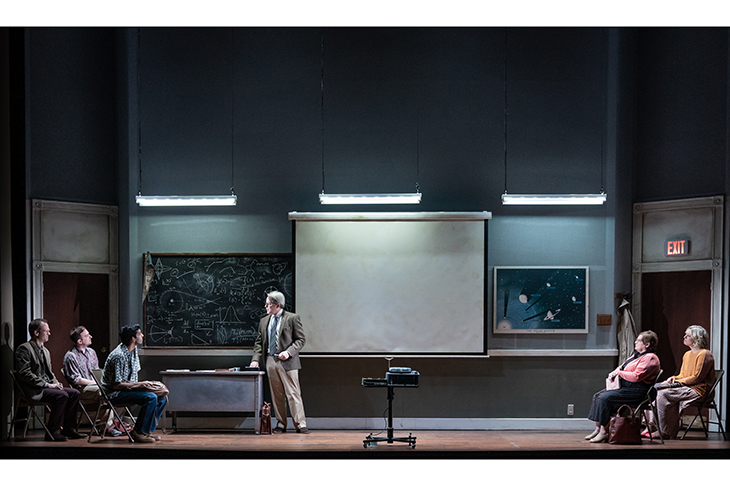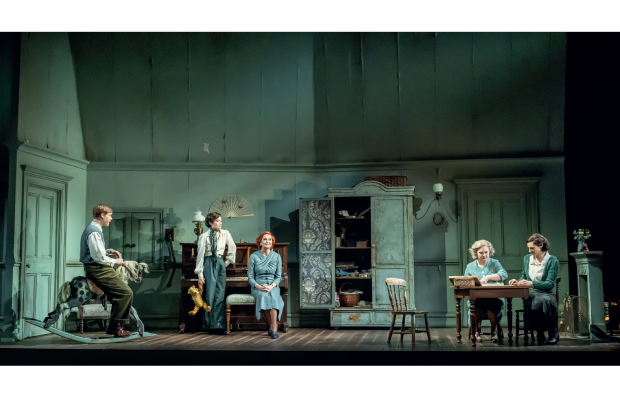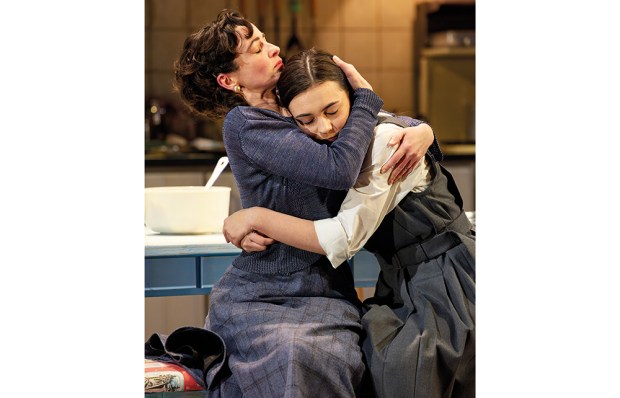Kenneth Lonergan, who wrote the movie Manchester by the Sea, shapes his work from loss, disillusionment, small-mindedness, hesitation and superficiality, all the forgettable detritus of life. The Starry Messenger is about Mark, a disappointed astronomer aged 52, who gives public lectures at a city planetarium. He loves his subject even though it let him down and every week he tackles the daft questions of his pupils with superhuman patience.
The same two pests always raise their hands. One is a burly misanthrope who disbelieves all experts, the other is a high-flying oddball who craves attention. Mark starts a slow-burn affair with Angela, a single mum who needs a role model for her nine-year old son: an expert on the stars and inter-planetary travel is just the ticket. Back at home Mark is cared for by a kindly wife who prattles about sofa beds and dry cleaning. In the basement lurks a teenage boy miserably thrashing at an amplified guitar.
Lonergan’s amazingly naturalistic dialogue captures the beating essence of every human being he creates. And his walk-on characters are as vivid and quirky as the central figures. Angela nurses an old man whose cancer is in remission. ‘I preferred you when you were dying,’ says his prickly daughter. Mark’s son, who is never seen, is revealed to be more than just an angry little maniac. He’s a decent, courteous lad in need of emotional nourishment. At the close of Act One, Mark’s chief tormentor lingers after class to deliver a critique of the lecture course and to award Mark grades — ‘poor’, ‘adequate’ and so on — for various sub-disciplines of the teaching profession. Mark endures this insolent cross-examination in silence and then bids his pupil farewell. He’s left alone in the lecture room. ‘Fuck you,’ he says, then he frowns and swipes a palm sideways to erase the expletive from the universe.
From such tiny threads, the rich tapestry of this show is woven. Some have carped at the lack of pace. But that’s the point. Its rhythm is attuned to the heartbeat of the everyday, like the broken tap that beats a tattoo in the sink. And although Lonergan is a meticulous documentary realist he’s not above using the conventions of farce. He deploys the ‘amorous clinch witnessed by shocked innocents’ device no fewer than three times. Matthew Broderick delivers a faultless performance as the low-rent academic who compensates for his professional failings by taking up with a younger woman. He knows it’s wrong, he does it anyway, and it doesn’t help. Something poetic and profound underlies this play. A flawed human tries to explain the mysteries of the cosmos to his uncomprehending tribe and yet he judges himself by the pettiest of all earthly indicators: success.
Rutherford and Son is a brilliant proto-feminist drama by Githa Sowerby (1876–1970) which opened at the Royal Court in 1912 and transferred to the West End and New York. Not many of the Royal Court’s current crop of playwrights are likely to repeat that feat.
The setting is a glassworks in the north-east run by ‘the guvnor’, Rutherford, a brilliant businessman whose touch has deserted him. His son, John, was sent to Harrow to become a gent but the upper crust sneered at him because he said ‘thank you’ to servants. John is a talented chemist who has discovered a formula that may save the firm from bankruptcy but he demands that his father pay the full market price.
Rutherford refuses and tries to obtain the formula by subterfuge. Other siblings vie for attention. Dick is a wet curate who wants to become a preacher in Blackpool. Janet, unmarried at 36, is covertly entangled with Martin, the clerk of works, but when Rutherford learns of their affair he evicts her from his house. Martin is no better. He’s happy to tryst with her on the sly but when their dalliance becomes public knowledge his position is threatened. Grubbing two shillings from his pocket, he sends her packing.
This fascinating play blazes with a quiet fury. Sowerby wanted to castigate Rutherford and Martin for their mistreatment of Janet but she would have known that the auditorium at the Royal Court would be full of Rutherfords and Martins. There would have been Janets in attendance as well but they wouldn’t have paid for their tickets. Polly Findlay’s fine production includes wailing singers (somewhat superfluous) and a dark, oaky Edwardian sitting room with the lights set to ‘battery-save’ mode. The gloom may be accurate but it does little to cheer the spirits.
Roger Allam, concealed behind a monstrous beard like a petrified cataract, brings touches of cordiality and even sweetness to Rutherford. Justine Mitchell is a graceful and deadly earnest Janet, and Sam Troughton is wonderful as the strutting buffoon John, who thinks he’s hit the jackpot. Word of warning: everyone talks like Gazza. Non-native Brits may need to do some homework in advance.
Got something to add? Join the discussion and comment below.
Get 10 issues for just $10
Subscribe to The Spectator Australia today for the next 10 magazine issues, plus full online access, for just $10.
You might disagree with half of it, but you’ll enjoy reading all of it. Try your first month for free, then just $2 a week for the remainder of your first year.














Comments
Don't miss out
Join the conversation with other Spectator Australia readers. Subscribe to leave a comment.
SUBSCRIBEAlready a subscriber? Log in